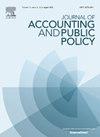To switch or not to switch? The effect of audit firms’ economies of scale on audit firm switches after audit price deregulation in China
Abstract
We exploit the unique setting of China’s 2014 audit price deregulation policy to examine whether audit firms use their economies of scale (EOS) to compete for clients. We find a significant increase in client firms switching from a non-EOS auditor to an EOS auditor after the audit price deregulation policy was implemented. The additional analyses show that EOS audit firms are more likely to offer audit fee discounts than non-EOS audit firms while retaining audit quality. We also find that the auditors’ EOS effect is more pronounced for highly homogeneous industries and firms paying high abnormal audit fees, firms in financial distress, and firms receiving less capital market attention than for less homogeneous industries and firms paying low abnormal audit fees, financially stable firms, and firms receiving more capital market attention. Finally, we find that the presence of state-owned enterprises and political connections both separately and jointly moderate the effect of audit firm–client realignments from a non-EOS auditor to an EOS auditor after the audit price deregulation. Overall, our study provides important insights for policymakers and regulators reviewing and developing new policies on audit services.

 求助内容:
求助内容: 应助结果提醒方式:
应助结果提醒方式:


